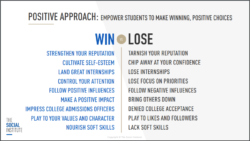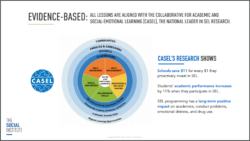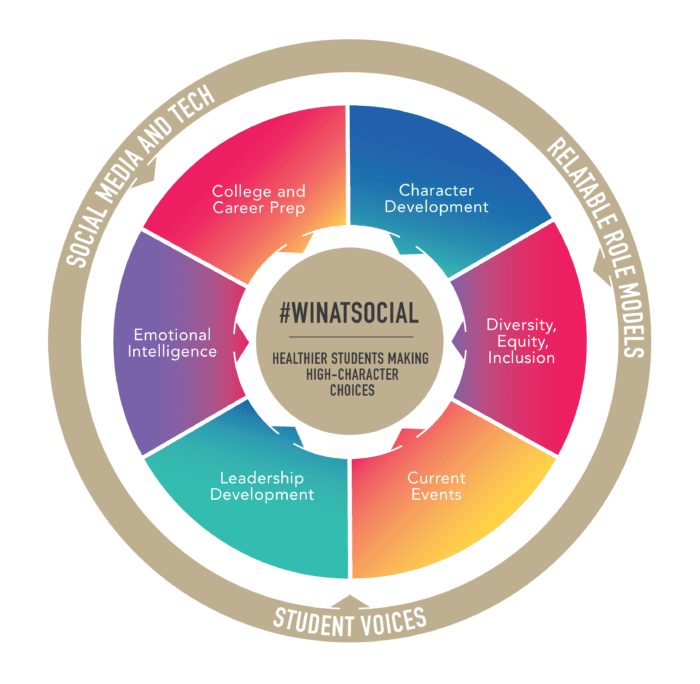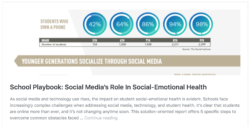Defining modern social-emotional learning
By Laura Tierney, Founder & CEO at The Social Institute
Student technology and social media use are skyrocketing and schools struggle to keep up. From texting to TikTok to online coursework, students don’t distinguish between the physical world and the digital world. It’s all the same. Social media is just being social. With technology’s rate of change, student experiences evolve quickly. How can schools continue to foster healthy, productive learning environments?
What is Social-Emotional Learning?
Social-emotional learning was popularized in the United States over 50 years ago, but despite advances in education, typical social-emotional learning programs don’t address the whole student. The Social Institute incorporates student experiences fully and has developed a modern approach to SEL that students respect and embrace.
Taking a Positive Approach
Numerous research studies have shown that positive thinking and action can lead to positive outcomes. Over time, as decisions compound, behaviors can become even more exaggerated toward the positive or the negative. We can become cynical, worried people if we’re not proactively positive. Students are no different.
We can empower students of all ages in elementary, middle, or high school to make positive, high-character decisions. The long-term benefits of SEL are clear and create a positive impact up to 18 years later on academics, conduct, emotional distress, and drug use. We take a positive approach to create health, productive lives.

CASEL (Collaborative for Academic, Social, and Emotional Learning), a national leader in SEL, promotes five core competencies for students. Our team at The Social Institute aligns every lesson we create with these competencies so that educators can see the skills that students are gaining.

The Social Institute’s unique methodology builds on CASEL competencies and incorporates the student experience fully. Technology use, social media, behavioral trends, and mentors form the outer ring. These components are the underlying foundation of our unique approach.
Our turnkey #WinAtSocial Curriculum and #WinAtSocial LIVE Lessons incorporate topics like inclusion, character development, leadership, and emotional intelligence to create a comprehensive, systemic approach to modern social-emotional learning. Students experience lessons through a highly-engaging, interactive digital platform, with developmentally appropriate lessons from 4th grade to 12th grade.

How to Teach Modern SEL
Our program meets students on their level, with topics and content that they embrace. Our work is student-led with student voices integrated throughout. Teachers using our program require very little training because the technology platform does the work. Anyone facilitating a #WinAtSocial Lesson should be ready for an engaging conversation.
Here are a few tips we give teachers:
- Master a growth mindset: Instead of lecturing the class, foster discussion with peer-to-peer student influence and collaboration.
- Integrate SEL skills into your classroom: Find time in your day to incorporate topics that address the student experience fully, such as social media, technology, and behavioral trends.
- Embrace technology: By maintaining a positive attitude towards new technology, teachers encourage students to be growth minded themselves. This technique also builds trust with students, so that they are more receptive when teachers do need to issue a warning about technology.
- Elevate your SEL facilitation skills: Think back to a few themes of modern SEL and map lessons throughout the year to align with the school’s calendar. During lessons, ask questions and follow the flow of conversation to engage students. Finally, establish a sustained conversation for sequenced education as students grow. Check out more tips from teachers in this facilitation tips article!
School-wide Change
Changing school communities means aligning with the school’s leadership team and defining actionable steps to move forward. The Social Institute offers a downloadable, free School Playbook that explores social media’s role in social-emotional health and provides steps that schools can take to support the whole student.
Students spend an average of 8.3 hours per day on social media, but most students report that they typically don’t speak to adults about their experiences online. We have an opportunity to change lives through healthy conversation and proactive programs in modern SEL. To all the educators reading, let’s do this!
About The Social Institute
The Social Institute partners with schools nationwide to empower students, families, and educators to positively navigate social-emotional health, social media, and technology. Schools access our student-respected, turnkey curriculum through WinAtSocial.com, an interactive, gamified learning platform. With solutions for students, parents, and educators, we offer a systemic and comprehensive SEL program through a unique and positive approach. We are proud to serve public and independent partners such as Ravenscroft School, Woodward Academy, Oldfields School, All Saints Episcopal School, Lake Forest School District, Boston Public Schools, and more. For more information on how to empower your students to make high-character decisions online and off, please contact us.

